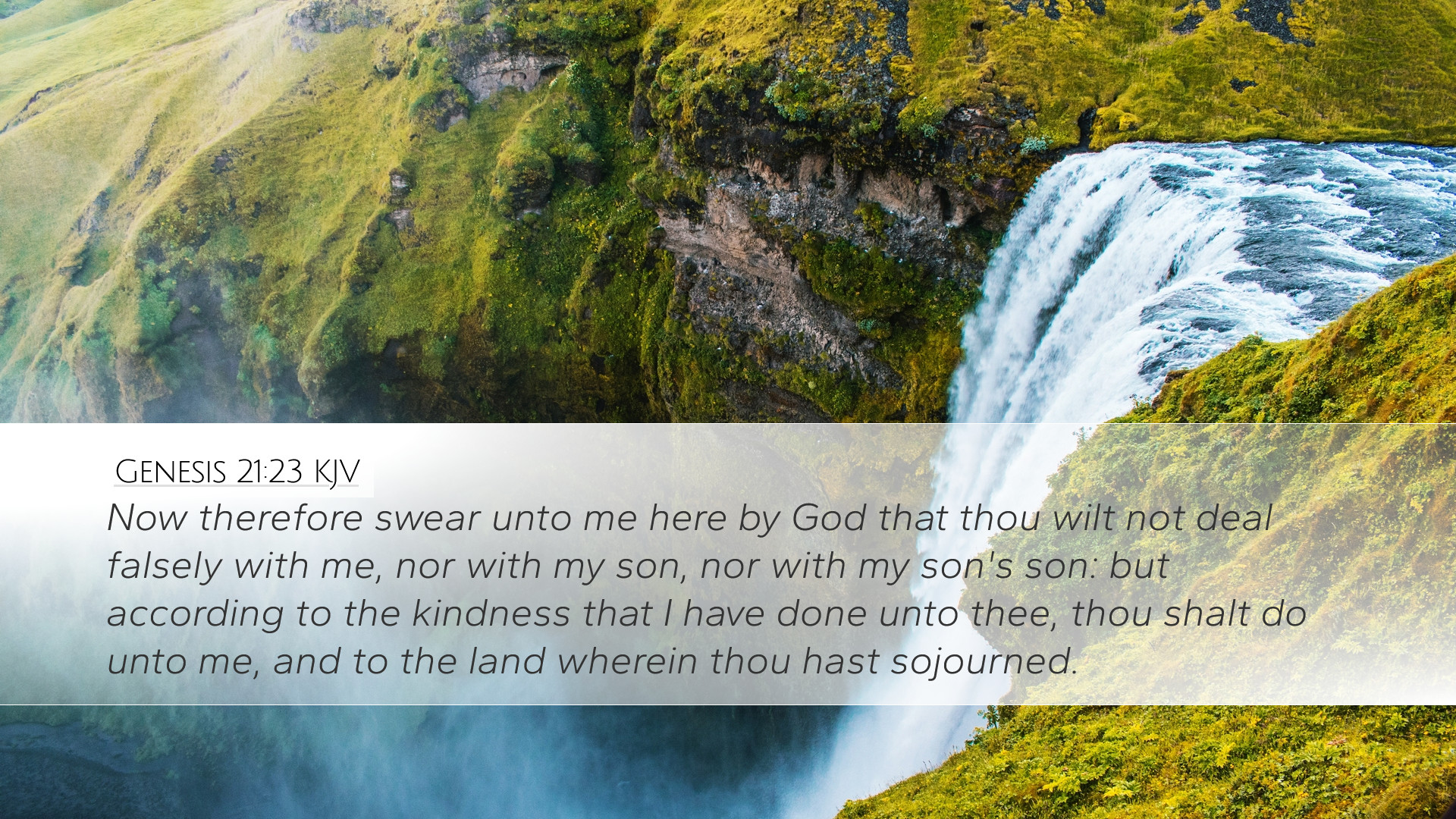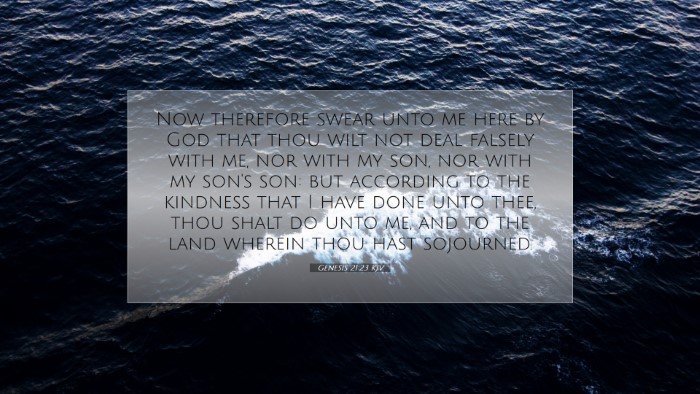Commentary on Genesis 21:23
Genesis 21:23 states: "Now therefore swear unto me here by God that thou wilt not deal falsely with me, nor with my son, nor with my son's son: but according to the kindness that I have done unto thee, thou shalt do unto me, and to the land wherein thou hast sojourned." This verse captures a significant moment in the relationship between Abraham and Abimelech, highlighting themes of covenant, trust, and human relationships under divine oversight.
Contextual Overview
This passage is situated within the broader narrative of Abraham's life, particularly his interactions with foreign rulers. The genesis of the promise made to Abraham and the subsequent covenants set the stage for this particular dialogue. Abraham, having recently settled disputes over wells with Abimelech, desires a formal agreement to ensure peace and mutual goodwill.
Theological Themes
- Covenantal Relationships: The request for an oath signifies the importance of covenant in the ancient Near Eastern culture. Swearing an oath was a binding agreement that invoked God as a witness, establishing a sacred commitment.
- Integrity and Kindness: Abraham appeals to the shared kindness he has shown, emphasizing the principle of reciprocity that should govern relationships (Genesis 21:22). This illustrates a profound ethical standard that extends beyond mere legal agreements.
- Divine Witness: Swearing by God reinforces the notion that the divine observes human actions, invoking a serious consideration of truthfulness and fidelity in dealings.
Insights from Public Domain Commentaries
Matthew Henry's Commentary
Henry emphasizes the commitment and faithfulness that should characterize believers' relationships. He highlights that Abraham's request for an oath from Abimelech underscores a desire for peace and trust—qualities fundamental to any godly relationship. Henry points out that swearing by God not only established a legal pact but also acknowledged God's sovereignty over their dealings.
Albert Barnes' Notes on the Bible
Barnes notes the cultural significance of oaths in Abraham's time, indicating that such promises were essential to maintaining peace between differing populations. He illustrates how this moment reflects Abraham's wisdom as a leader and his foresight in ensuring the well-being of his descendants. Barnes further asserts that this act symbolizes a divinely-ordained method of ensuring justice and kindness in interpersonal relationships.
Adam Clarke's Commentary
Clarke comments extensively on the nature of the oath, indicating that it serves as a mechanism of accountability. He posits that Abraham's insistence on mutual kindness reveals an understanding of the relational dynamics between nations—where goodwill must be fostered actively to prevent conflicts. Clarke also reflects on how such agreements foreshadow greater spiritual truths of dependence and trust in God.
Practical Applications for Leaders and Scholars
The principles extracted from this verse can prove beneficial in contemporary ministry and scholarship. The emphasis on integrity, kindness, and covenantal relationships is pertinent for pastoral leadership and church community dynamics. Here are some applications:
- Modeling Relationships: Leaders should cultivate environments where trust and kindness are paramount, echoing Abraham's example.
- Formal Agreements in Ministry: The significance of clear, mutual commitments can be emphasized in church partnerships, mission arrangements, and community engagement without compromising biblical ethics.
- Reciprocal Kindness: Encouraging congregations to practice kindness and integrity amongst one another mirrors the ethos of Abraham's connections.
- Awareness of Divine Oversight: Mutual agreements must acknowledge God's presence, aligning human commitments with divine purposes and expectations.
Conclusion
Genesis 21:23 serves not merely as a historical account but as timeless guidance on fostering healthy, God-honoring human relationships. The intertwining of divine witness, ethical conduct, and the manifestations of kindness as critical components in covenantal dealings should challenge modern believers to reevaluate their own relationships and commitments. By adhering to such biblical principles, believers can reflect God's character in a world that desperately needs integrity and reconciliation.


